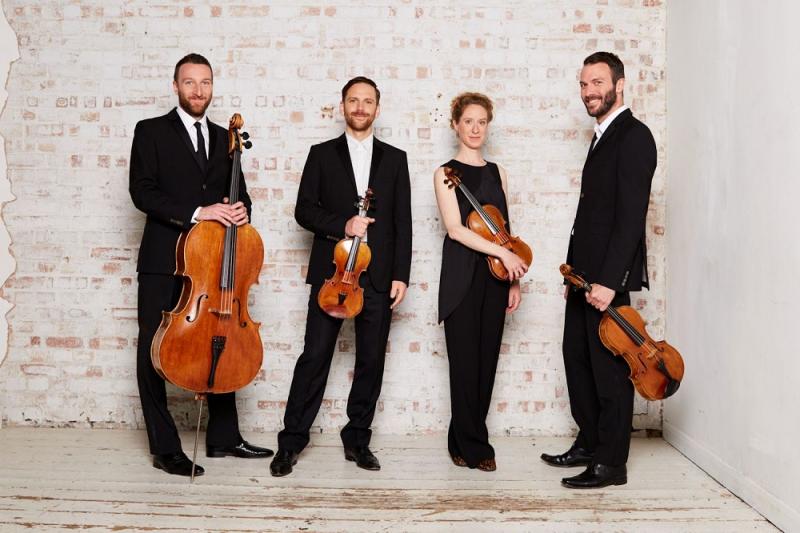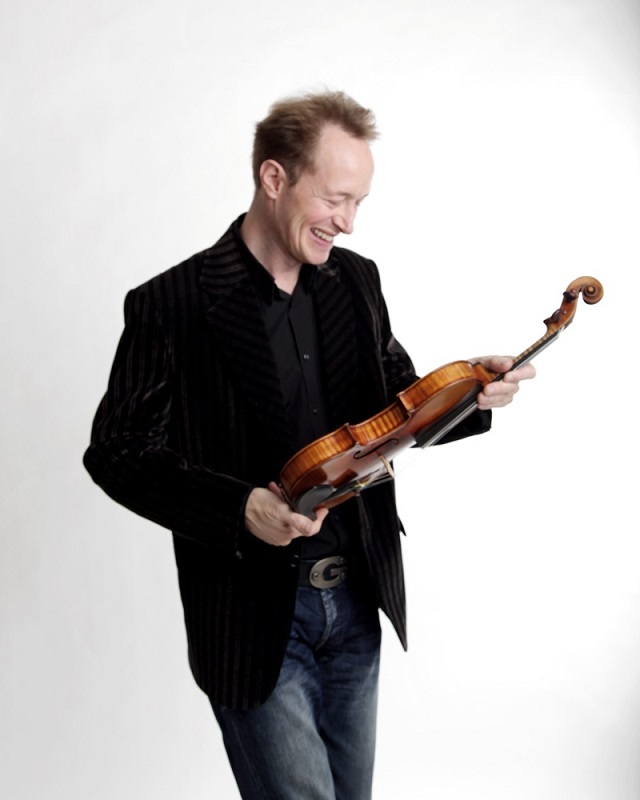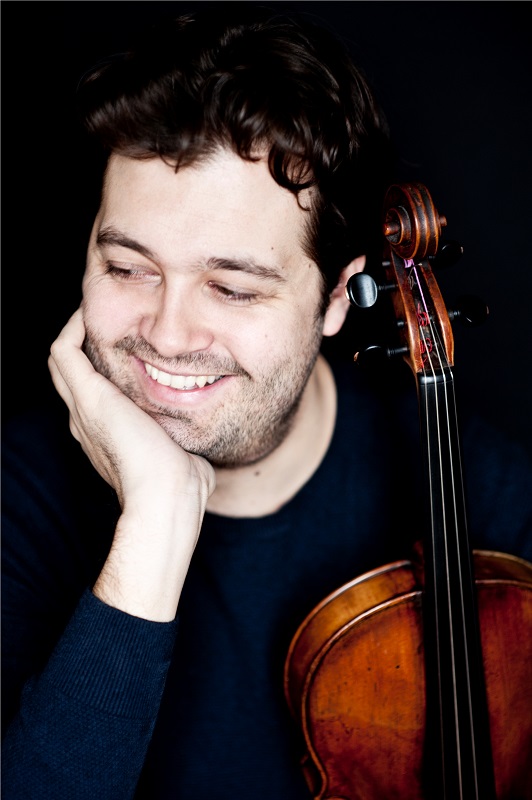Octets, Wigmore Hall review - Heath Quartet and star friends effervesce | reviews, news & interviews
Octets, Wigmore Hall review - Heath Quartet and star friends effervesce
Octets, Wigmore Hall review - Heath Quartet and star friends effervesce
Enescu's rare visitor holds its own against Mendelssohn's youthful masterpiece

To compose a masterpiece in your teens is rare enough; to choose the most elaborate form in chamber music, an octet for eight strings, ensures a peculiar kind of immortality.
 Intriguingly the eight players at the Wigmore Hall last night left the greatest impression in the darker and more troubling colours of this E flat treasure. There was ardour here, but less of the sheer joy I encountered in a dazzling performance at the East Neuk Festival combining young artists from the annual Retreat with their mentors and led by the supremely cultured Benjamin Baker. Great Anthony Marwood (pictured left by Pia Johnson) soared to the heavens here with refulgent tone, but a tad unsmilingly - you want to see as well as hear the pleasure taken.
Intriguingly the eight players at the Wigmore Hall last night left the greatest impression in the darker and more troubling colours of this E flat treasure. There was ardour here, but less of the sheer joy I encountered in a dazzling performance at the East Neuk Festival combining young artists from the annual Retreat with their mentors and led by the supremely cultured Benjamin Baker. Great Anthony Marwood (pictured left by Pia Johnson) soared to the heavens here with refulgent tone, but a tad unsmilingly - you want to see as well as hear the pleasure taken.
It wasn't until the heart of the first movement that the right emotional note - by which I probably mean no more than one I expected - was struck. But then the team made so much of the shadows in the Andante and the dematerialising at the end of an initially less-than-supernatural Scherzo that you quickly yielded to the mastery. And that stunning fugal writing by the young Mendelssohn at the start of the finale is all the more delectable when the eye travels so swiftly from the cellos on the right (Richard Lester and Christopher Murray) across the staggered entries to the first violin on the left. The richness of the whole was gilded by the oaky timbre of top viola-player Lawrence Power at the core of the ensemble. Power (pictured right by Giorgia Bertazzi) had a more significant solo role to play in the endless and unusual melody of the Enescu Octet, first in canon with Marwood's ever more sophisticated lines and then switching from bold projection to a distant, viola-d'amore-type voice in what feels like a slow movement but is actually another episode in the complex but always dance-flowing first movement. So full of wonders was it that you wanted to catch some of its ideas again, rewind back a minute or two.
Power (pictured right by Giorgia Bertazzi) had a more significant solo role to play in the endless and unusual melody of the Enescu Octet, first in canon with Marwood's ever more sophisticated lines and then switching from bold projection to a distant, viola-d'amore-type voice in what feels like a slow movement but is actually another episode in the complex but always dance-flowing first movement. So full of wonders was it that you wanted to catch some of its ideas again, rewind back a minute or two.
The most sustained meditation is the third movement - a hypnotic throb where at first the super-subtle Isabelle van Keulen took the lead before Marwood came to the fore again. And although the fierce waltz-finale - another of those turn-of-the-century dances which drives close to the abyss to come but pulls itself back to assertice triumph - revives the second movement's coincidental shades of Schoenberg's sextet Verklärte Nacht, massive good humour revives to give a Beethoven-like sense of one prospective end after another. This is a work which deserves to be right at the core of the chamber repertoire. Due, though, to the harmonic waywardness which deprives the listener of clear orientation in the abundance of melodies and to the fiendish amount of rehearsal time which certainly paid off here, it seems likely to remain a rare visitor from another planet.
rating
Share this article
The future of Arts Journalism
You can stop theartsdesk.com closing!
We urgently need financing to survive. Our fundraising drive has thus far raised £49,000 but we need to reach £100,000 or we will be forced to close. Please contribute here: https://gofund.me/c3f6033d
And if you can forward this information to anyone who might assist, we’d be grateful.

Subscribe to theartsdesk.com
Thank you for continuing to read our work on theartsdesk.com. For unlimited access to every article in its entirety, including our archive of more than 15,000 pieces, we're asking for £5 per month or £40 per year. We feel it's a very good deal, and hope you do too.
To take a subscription now simply click here.
And if you're looking for that extra gift for a friend or family member, why not treat them to a theartsdesk.com gift subscription?
more Classical music
 Lammermuir Festival 2025 review - music with soul from the heart of East Lothian
Baroque splendour, and chamber-ensemble drama, amid history-haunted lands
Lammermuir Festival 2025 review - music with soul from the heart of East Lothian
Baroque splendour, and chamber-ensemble drama, amid history-haunted lands
 BBC Proms: Steinbacher, RPO, Petrenko / Sternath, BBCSO, Oramo review - double-bill mixed bag
Young pianist shines in Grieg but Bliss’s portentous cantata disappoints
BBC Proms: Steinbacher, RPO, Petrenko / Sternath, BBCSO, Oramo review - double-bill mixed bag
Young pianist shines in Grieg but Bliss’s portentous cantata disappoints
 theartsdesk at the Lahti Sibelius Festival - early epics by the Finnish master in context
Finnish heroes meet their Austro-German counterparts in breathtaking interpretations
theartsdesk at the Lahti Sibelius Festival - early epics by the Finnish master in context
Finnish heroes meet their Austro-German counterparts in breathtaking interpretations
 Classical CDs: Sleigh rides, pancakes and cigars
Two big boxes, plus new music for brass and a pair of clarinet concertos
Classical CDs: Sleigh rides, pancakes and cigars
Two big boxes, plus new music for brass and a pair of clarinet concertos
 Waley-Cohen, Manchester Camerata, Pether, Whitworth Art Gallery, Manchester review - premiere of no ordinary violin concerto
Images of maternal care inspired by Hepworth and played in a gallery setting
Waley-Cohen, Manchester Camerata, Pether, Whitworth Art Gallery, Manchester review - premiere of no ordinary violin concerto
Images of maternal care inspired by Hepworth and played in a gallery setting
 BBC Proms: Barruk, Norwegian Chamber Orchestra, Kuusisto review - vague incantations, precise laments
First-half mix of Sámi songs and string things falters, but Shostakovich scours the soul
BBC Proms: Barruk, Norwegian Chamber Orchestra, Kuusisto review - vague incantations, precise laments
First-half mix of Sámi songs and string things falters, but Shostakovich scours the soul
 BBC Proms: Alexander’s Feast, Irish Baroque Orchestra, Whelan review - rapturous Handel fills the space
Pure joy, with a touch of introspection, from a great ensemble and three superb soloists
BBC Proms: Alexander’s Feast, Irish Baroque Orchestra, Whelan review - rapturous Handel fills the space
Pure joy, with a touch of introspection, from a great ensemble and three superb soloists
 BBC Proms: Moore, LSO, Bancroft review - the freshness of morning wind and brass
English concert band music...and an outlier
BBC Proms: Moore, LSO, Bancroft review - the freshness of morning wind and brass
English concert band music...and an outlier
 Willis-Sørensen, Ukrainian Freedom Orchestra, Wilson, Cadogan Hall review - romantic resilience
Passion, and polish, from Kyiv's musical warriors
Willis-Sørensen, Ukrainian Freedom Orchestra, Wilson, Cadogan Hall review - romantic resilience
Passion, and polish, from Kyiv's musical warriors
 BBC Proms: Faust, Gewandhausorchester Leipzig, Nelsons review - grace, then grandeur
A great fiddler lightens a dense orchestral palette
BBC Proms: Faust, Gewandhausorchester Leipzig, Nelsons review - grace, then grandeur
A great fiddler lightens a dense orchestral palette
 BBC Proms: Jansen, Royal Concertgebouw Orchestra, Mäkelä review - confirming a phenomenon
Second Prom of a great orchestra and chief conductor in waiting never puts a foot wrong
BBC Proms: Jansen, Royal Concertgebouw Orchestra, Mäkelä review - confirming a phenomenon
Second Prom of a great orchestra and chief conductor in waiting never puts a foot wrong
 BBC Proms: Royal Concertgebouw Orchestra, Mäkelä review - defiantly introverted Mahler 5 gives food for thought
Chief Conductor in Waiting has supple, nuanced chemistry with a great orchestra
BBC Proms: Royal Concertgebouw Orchestra, Mäkelä review - defiantly introverted Mahler 5 gives food for thought
Chief Conductor in Waiting has supple, nuanced chemistry with a great orchestra

Add comment